The Smith & Wesson Model 19 Carry Comp comes from the S&W Performance Center, in their new branded gray polymer box. The gun ships with wood stocks (looks like rosewood) installed and – thoughtfully – with S&W branded rubber stocks in the box. The wood looks good in pictures, the softer stocks feel better when shooting the gun.
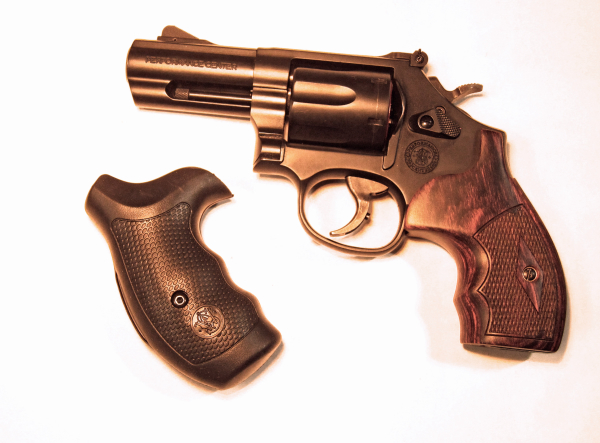
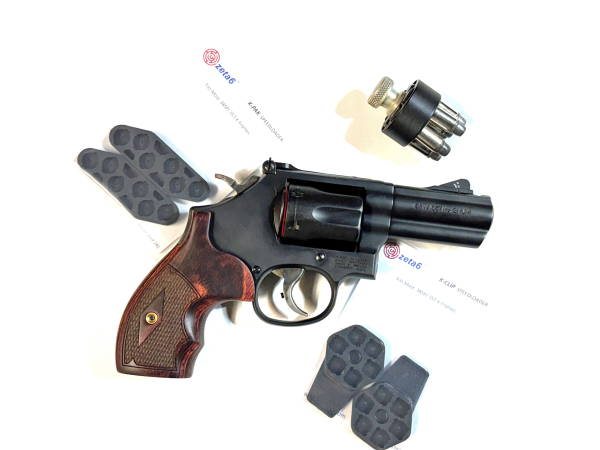
After a photography session, the lumber went back in the box and the synthetic stocks went onto the gun.
The Carry Comp features a front sight which is fitted with a tritium vial. The sight is pinned on – in case you want to change it. There’s no front locking pin in the underlug of the barrel. Front lock up is accomplished by a crane lock. The trigger has a permanently attached trigger stop. On the left side of the frame under the cylinder latch is the Performance Center logo.
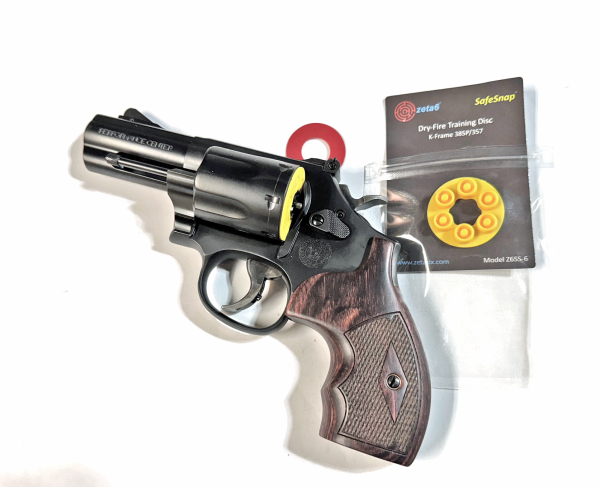

The barrel isn’t just ported – it’s an expansion chamber called the “PowerPort Vented Barrel.” It’s cut above and around the circumference of the bore. There is vestigial rifling around the leading edge of the expansion chamber at the muzzle. I could see powder granules left inside the expansion chamber from factory test-firing.
At least it looks like unburnt powder.
The finish is a pleasant flat black. The front of the cylinder appears to be rounded, not sharp, to facilitate holstering the piece.
It is a Carry Comp, after all.
A (weather-belated) range trip took me to an indoor range with just four different loads to try.
(Note to self: Next time, take a screwdriver set to adjust the sights.)
Yes, I had no screwdrivers – and the range had no flat-ground screwdrivers. I was left with using good old Kansas-guesstimate holds just like I would have had to do at any other range – when being unprepared.
The first five rounds of old stock Speer 158gr. Gold Dot HP 357 Magnum went below my legal paper-size target into the pre-shot cardboard backer at 25 yards.
I can confirm that (1) the flash from the comp is more than a little exhilarating; (2) that the Magnum recoil – pronounced – was not at all painful or disorienting, likely due to the comp cut and the rubber stocks provided by the Performance Center; and (3) the single action pull is stiffer than old S&Ws, but it still features a crisp let-off.
After the screw driver debacle, I moved the target to seven yards – I had to see where the rounds were going – and loaded with Federal Premium 158gr. HydraShok HPs. These thumpers likewise hit low and left – I was holding top of the “9” ring and shooting double action. The hits about touched and were five-inches low.
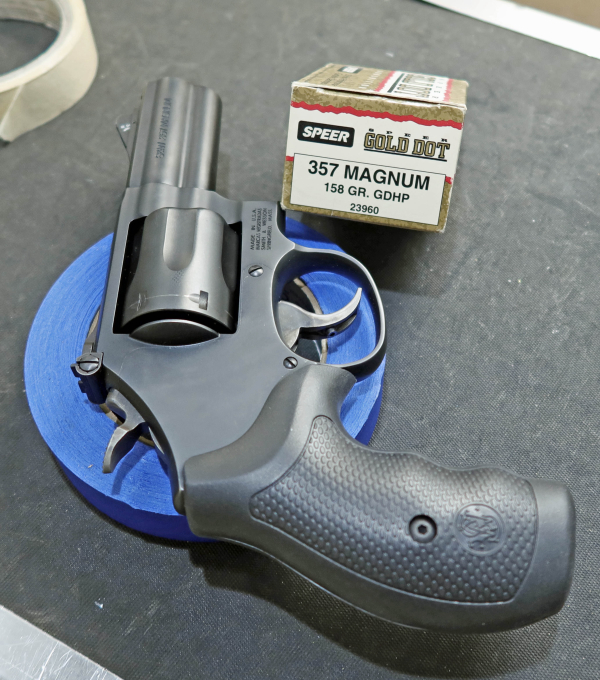
Remington Golden Saber 125gr. 357 Magnums were striking 3 ½” low at 7 yards, with the hits nearly inside one hole. Firing old-stock Remington LeadLess 125gr. Flatnose Enclosed Base ammo at ten yards, I saw that the 38 ammo was less-liked, clustering into 3” with the best three into 1 ¾”.
It took another range trip to get this thing at zeroed before LEOSA.
Common ‘quick-loading’ devices, like those from HKS and Zeta-6, work with this 6-shot K-frame 38/357 revolver. Zeta6’s “SafeSnap” dry-practice training disc for K-frame revolvers is likewise a fit and a smart bit of gear to enhance practice. I keep it in the gun – in the box, in the safe – so I can see with a glance that no live ammo is in the gun.
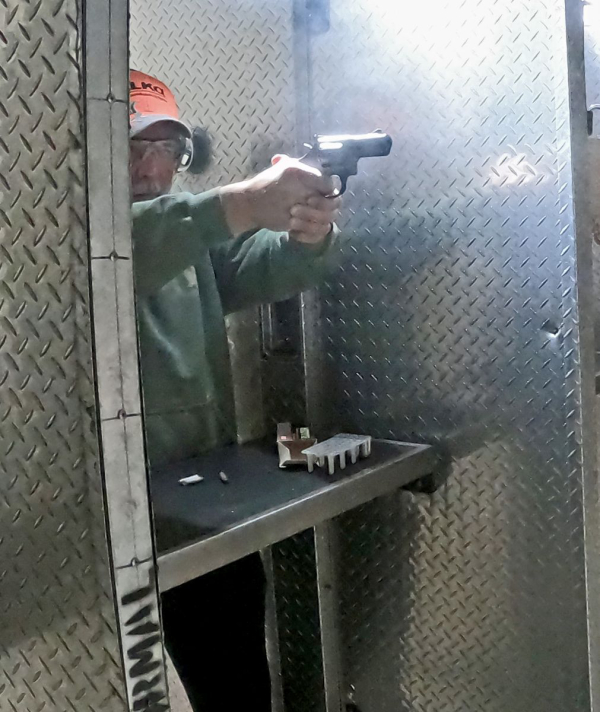
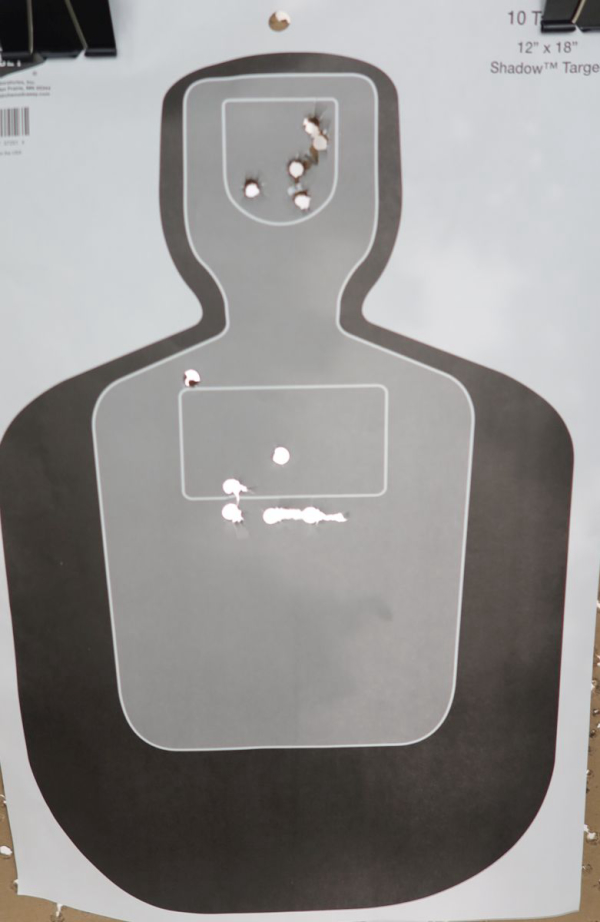
The gun retails for just under $1,300 – not cheap, but you get what you pay for. It’s a 34oz. carbon steel gun with, according to the factory website, has a stainless-steel barrel.
If the barrel is indeed stainless, it’s nicely finished in the same flat-black as the rest of the business-like cannon.
In the “close the barn door after the horse got out” department, I haunted the local Academy Outdoor Sports location and snagged theWheeler “Spacesaver” screwdriver set, designed to go into the range bag. Heavier than I need, with more bits than I’d normally use, it's a 36-piece set with Hex, Torx, flat and Phillips bits. With the confusing array of optics -and non-optics – guns I’m taking to ranges these days, such an expansive kit will likely cover any needs. And, the price was right.
That was handy as we had enough of a break in the weather to take this cannon to the club range. It was the matter of a few moments and around fifteen rounds of CCI-Blazer 357 Magnum aluminum-case 125 grain SP ammo to get the M19 zeroed at fifteen yards.
A short indoor range trip with Legendary Lawman Marshal Chuck Haggard followed. I had the presence of mind to bring the Garmin Xero Pro C1 along. Some old stock Speer 158 gr. Gold Dot HP generated about 978 fps in the short, ported barrel. Some of the Speer Blazer (aluminum case) 125 gr. JSP ammo averaged about 1,090 fps.
Quoting Darryl Bolke, Chuck noted that the ported Magnum was like shooting while deploying a flashbang. The flash was incredible, but I didn’t capture it on digital media, alas. He shot the revolver quite well using the old Speer ammo.
Conclusions? I’ve long considered the most shootable handy revolvers to be three-inch-or-so guns. Long enough to provide decent accuracy out as far as you can shoot, being close enough to minimize “leading with the gun” in a search while being short enough to inhibit successful grabs at the unholstered handgun, the form factor is right for me. Ballistically, it’s a 2 ½” M19 (output and sight radius) with handling characteristics of the 3” guns.
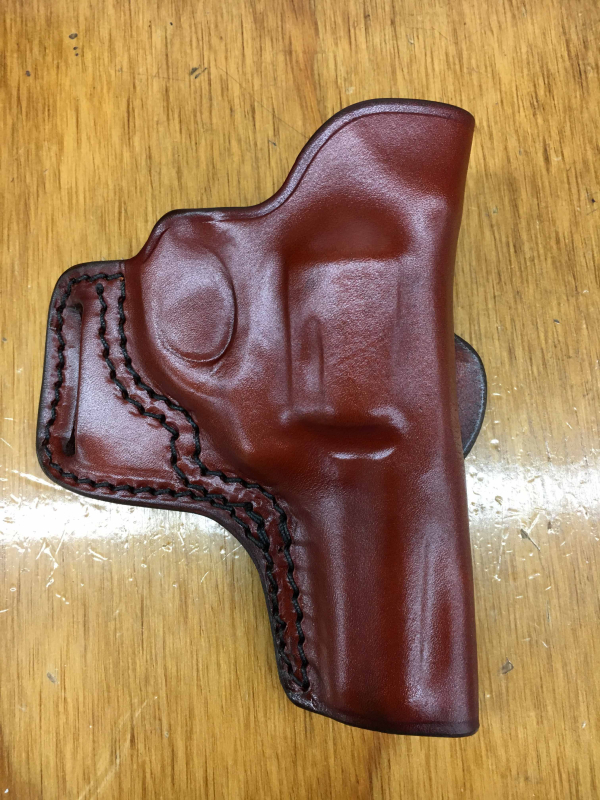
The practical synthetic stocks are “okay” for gripping, but smooth enough not to hang up fabric when worn concealed. For holsters, my go-to list includes rigs by Ritchie Leather Co. Inc and Simply Rugged. Either will fit up a holster for 3” K-frame revolvers.
In addition, they take a lot of discomfort out of a K-frame magnum. This gun is properly updated for resistance to wear – it’d take more shooting than I’m going to do to figure out how much.
If you like Magnum DA revolvers, this one is light, fast and accurate.
— Rich Grassi